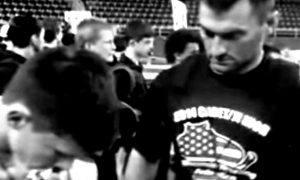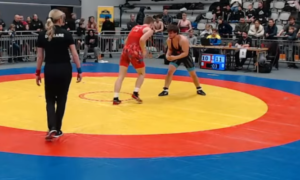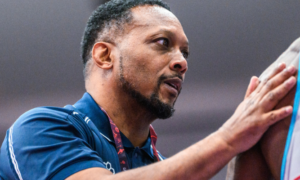During his remarkable career as a Greco-Roman athlete, Jim Gruenwald managed to become a two-time Olympian and one of the unquestioned leaders of the US National program. He was an elite international competitor who was uncompromising and vicious on the mat; yet filled with a love for Christ and a willingness to passionately share his faith off of it. Today, he is the head coach at Wheaton College in Illinois, as well as a highly-influential voice pertaining to all matters of encouragement, devotion, and Christian servitude.
Imagine hanging 2,000 feet above ground from a hang-glider and not being tethered properly, or at all. It happened to one individual a few years ago, when a pilot forgot to tether him for a tandem hang-gliding adventure. In an instant, this person was thrusted into a legitimate life-or-death moment. He held on for over two minutes. My “coach’s brain” immediately thought of somehow translating this scenario into a wrestling room experience. We have a Suples Gladiator Wall with four pull-up stations. Towards the end of practice, I described the situation and then put my guys to the test. How many lived out of 30? Myself and two others. The rest “died” that day, some mere seconds away from the two-minute mark. In their defense, this was an imaginary life-or-death moment; the test was after practice; and the closer one gets to two minutes, an injury would be the result, not death.
But there is no escaping that society is filled with pain-averse people, so I wanted to create that life-or-death simulation. I have done this for years in my own training as an athlete. It has also carried over for me as a coach in the weight room, as well as in everyday life. This was an opportunity to help my athletes to understand and adopt a similar mindset. It comes down to this: if you do not prepare for pain — not just survive the experience but thrive in it and look forward to the strain — then you will be like most and avoid real pain, and for some this leads to a resistance towards experiencing any pain at all. Being pain-free becomes even more relevant in a world where people want to live in a “safe space”. Granted, safe spaces might be needed occasionally (maybe rarely), but we cannot live there any more than we can live in the “Dark Place” (article forthcoming).
Pain exists in any life endeavor worth pursuing. Especially in athletics, and even more so in combat sports. And here is a little secret most will not share: winning is painful. Also, in nearly every possible way, winning is more painful than losing. Most do not notice that. Most simply observe the celebration and are blinded by the euphoria triumph has to offer. But underneath the thin veneer of victory, there is an underlying agony for those who have managed to prevail.
I have found that people who succeed consistently are willing to endure the pain necessary to win. Furthermore, because they understand that winning is not guaranteed, they embrace the journey and find value in the strain and discomfort of each moment. The journey is worth the pain regardless of the tangible results (e.g., trophies, medals, and so forth). Why? Because even greater are intangible results such as toughness (enduring pain) and compassion (helping others endure pain). These are the results that are transformational and lasting.
Those who consistently win not only accept and endure the pain, they also chase the pain. Chasing the Pain is not pain for pain’s sake. It is not a “stick my hand in the fire” kind of pain in search of some false movielike sense of toughness. Rather, it is productive pain — pain that develops, builds, and leads to the fulfillment of the intangible, but also has the hardwired potential, nearly inexorable, benefit of the tangible reward. Too many people, whether consciously or subconsciously, chose to lose. Meanwhile, winning represents enduring another practice, another match, another tournament… Winning means more pain.
Chasing the pain was not something I thought about as an athlete or articulated well as a coach until recent years. On some unspoken level, I had always followed and embraced the idea. I knew that I had to suffer as an athlete in order to improve. As an intellectual pursuit, chasing the pain is an idea I came across when reading Tom Ryan’s book Chosen Suffering. A partial biography, the book describes the qualities needed for ordinary people who hold extraordinary desires to become “Elite in Life and Leadership.” One concept that resonated with me was how “Chosen Suffering” (the range of moderate to extreme training) helps us manage “Unchosen Suffering” (injury, sickness, loss, etc.). The better we are at inuring ourselves to chosen suffering, the better we are when navigating the unexpected unchosen suffering.
Life is no different, and faith in Yeshua (Jesus) is even more appropriate. Yeshua chased the pain in a way that we will never know, because He knew the future in a way that we never can. Can you imagine leaving Heaven to experience death for something that you did not do? Let me be brutally frank: sinning is losing, and it is much easier to sin than to win. Sinning is easy, and there is little to no faith in easy. There is pain in admitting a mistake. There is pain in correcting others for their wrongdoing.
Winning is painful. But do whatever you can to find a way to win.
If you would like to follow up with Coach Gruenwald regarding faith development, or if you are someone who is searching, or just someone who is looking for help navigating life, he can be reached directly via email.

Listen to “5PM52: Two-Time Olympian Jim Gruenwald” on Spreaker.
Listen to “5PM51: Lining up with Tanner Farmer” on Spreaker.
Listen to “5PM50: Mr. Fantastic Benji Peak” on Spreaker.
SUBSCRIBE TO THE FIVE POINT MOVE PODCAST
iTunes | Stitcher | Spreaker | Google Play Music




















